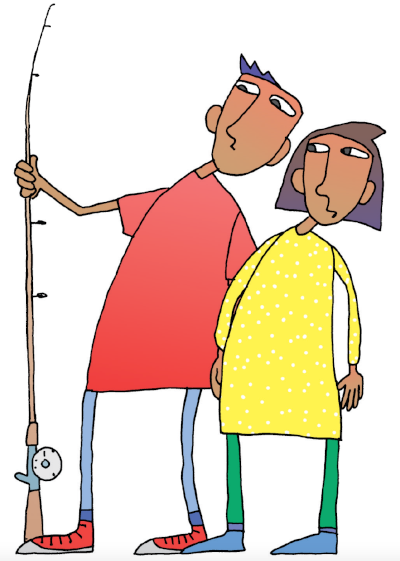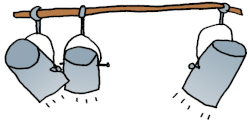Page 275

Writing Plays
When you were young, you spent a lot of time play-acting. You were an explorer in a land of dinosaurs, or a queen in a fairy court, or a tiger stalking through a deep jungle.
Now, you can do your play-acting on a stage, for applause!
You can write a play about anything—a morning ride on the school bus or a rocket ride to Mars. You can write a realistic play about people dealing with a flat tire or a fantastical play about kids with a talking fishing rod. Whatever you remember or imagine, you can write about. Then you and your friends can act out your play.
Places, everyone!
What’s Ahead
WE 276
Page 276
Sample Play: Act 1
You can begin your play by introducing the main characters and setting up a problem for them to solve.
Fishing Rod Stories
Characters: RAOUL, 12 years old; JULIA, 11 years old; JIGS, an enchanted fishing rod
ACT 1
(RAOUL and JULIA sit at the edge of the stage as if fishing from the shore of a lake one afternoon.)
RAOUL: (shaking head) It’s been an hour. Nothing!
JULIA: Maybe you should try lures instead of worms.
RAOUL: I used lures for the half hour before you showed up. It’s this rod. I think it’s cursed. Not even a nibble!
JIGS: (voice from the rod) Don’t blame me. . . .
JULIA: (looking at RAOUL) I didn’t blame you.
JIGS: (offended) “Not even a nibble!” he says. . . .
RAOUL: (leaping to his feet and staring at the rod) I think this thing just talked!
JIGS: The biggest fish in the whole lake was nibbling at my line, and you didn’t even notice. . . .
RAOUL: (shocked) Are you talking to me, Mr. Pole?
JIGS: The name is Jigs. My line got nibbled by a seven-foot Holy Mackerel, and you never set the hook!
JULIA: (standing to stare at JIGS) Is it cursed or blessed?
JIGS: Attach your biggest lure, and I’ll show you!
JULIA: (to RAOUL) If you want to catch a Holy Mackerel, you’d better listen to Jigs and attach that lure! . . .
WE 277
Page 277
Writing a Play
Prewriting Planning Your Play
Find the Main Parts 🟪 You’ll need at least two characters, a problem, and a place (the setting) for the action. Your characters can be based on people you know. The problem and action in your play can depict actual events that made you laugh or cry. Your setting may be a familiar place. You may also use your dreams and imagination to give you ideas.
Gather Details 🟪 Use a collection sheet or checklist to help you plan the details of your play. But don’t make your plan too complicated. Sometimes your characters can take over and almost “write” the play for you!
Collection Sheet
Main Characters #1 and #2:
(Give each character a name and an age that fits. Briefly describe how your characters look and act.)
Other Characters:
(Identify and describe all other characters.)
Setting:
(Describe the place—or places—where your play happens. If it’s important, also tell when the play takes place.)
Problem or Goal:
(State the problem or goal facing the main characters.)
Action:
(Describe your characters’ actions as they try to solve their problem or achieve their goal.)
Solution:
(Have your characters solve the problem.)
WE 278
Page 278
Writing Developing the First Draft
Set Up the Play 🟪 At the beginning, let the reader know the title of the play, the names of the characters, and the setting in which the play takes place. (See page 276.)
Start the Play 🟪 For the opening dialogue, you can have the characters talk about the scene they are in or have them discuss the problem or goal of the play. Each time a person talks, you must write the name of that person, followed by a colon.
Solve the Problem 🟪 In the middle of the play, have the characters work at solving the problem or reaching their goal. This is where most of the action takes place. The dialogue and action make the play move ahead. In the sample that begins on page 276, Raoul and Julia struggle to follow Jigs’s silly commands to catch a Holy Mackerel.
 © Thoughtful Learning 2024
© Thoughtful Learning 2024
Note To create excitement—and maybe a little fun—your main characters can disagree about how to solve the problem.
End the Play 🟪 End your play by showing how the main characters solve their problem or reach their goal. You may also choose to have your characters fail at their solutions, just as sometimes happens in real life.
Either way, the resolution should feel satisfying. Raoul and Julia want to catch a Holy Mackerel, but they also want to figure out if Jigs is blessed or cursed. The end needs to resolve all of those problems and show whether or not the kids befriend their talkative fishing rod.

Note To create excitement—and maybe a little fun—your main characters can disagree about how to solve the problem.
WE 279
Page 279
Revising Improving Your Writing
Read Aloud 🟪 Read your first draft aloud. Decide if the play moves along smoothly and clearly from beginning to end. See if any parts should be cut out or if anything needs to be added. Pay attention to each line. Put a check next to any lines that you want to rewrite.
Write Dialogue 🟪 Dialogue is what your characters say to each other. You want them to sound like real people talking. Listen to how your family, friends, and other people talk, and use the words they use. Which of these lines sounds more real?

Mr. Daniels: You are capable of exerting more effort when doing push-ups.
OR
Mr. Daniels: Two more push-ups! You got this!
Make a Point 🟪 Plays often share a theme or make a point about life. This message is carried through the characters’ actions and words. By the end of Fishing Rod Stories, the audience learns, along with Raoul and Julia, that if you exaggerate too often, people won’t believe you—even if you are an enchanted fishing rod. Make sure your point comes across.
Editing Polishing Your Play
Check for Errors 🟪 Review your writing for spelling, capitalization, and grammar errors. Then write a neat final draft of your play, following the form of the sample. Proofread the final draft again before sharing it. (See page 66 for an “Editing and Proofreading Checklist.”)
Tip Ask several classmates to read your play out loud. Listen carefully to find any dialogue that doesn’t sound real or actions that aren’t believable. Change them to better fit the rest of the play.
WE 280
Page 280
Sample Play: Act 2
In the first act of this play on page 276, Raoul and Julia discover they have an enchanted fishing rod. Here, in Act 2, their attempts to catch a Holy Mackerel lead to a series of funny problems.